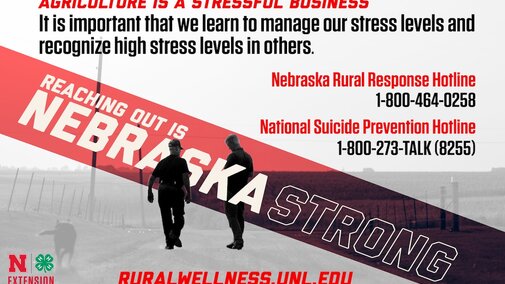You do not have to go far on social media to find farmers in tractors or families out with newborn calves with the hashtag “social distancing” and the caption “I’ll be engaging in social distancing this spring, like I do every year!”
The truth is for many farmers and ranchers the physical act of social distancing may not be as big of a challenge as it is for our urban counterparts. However, COVID-19 has changed everyone’s lifestyle, even those of farmers and ranchers. Yes, it may be easier to stay six feet from the nearest person but that doesn’t mean that farmers and ranchers aren’t having to cope with uncertainty.
- Commodity Prices - The greatest challenge many producers are facing is price uncertainty. For the most part, commodity markets have had a downward trend throughout the COVID-19 outbreak. The demand for ethanol, milk, and beef have dropped, causing prices to fall. Furthermore, there is uncertainty regarding farmer’s markets across the state, making it difficult for direct to consumer producers.
- Changes in off-farm income – Another challenge may be the reduction or loss of off-farm income. According to the 2017 USDA Census of Agriculture, over 50% of Nebraska’s producers worked off-farm.
- Changes in working conditions – Day-to-day activities have changed for everyone. For some, spouses are working from home. For others, kids are now homeschooled. Even “parts runs” are subject to social distancing restrictions, as farm and ranch supply stores ask patrons to call ahead for pick-up or to order parts for delivery.
- Protecting vulnerable family members – Like many others, farmers and ranchers are concerned about the health and wellbeing of their families. This may mean changing how things are done to protect those who are most at risk. Some may be asking vulnerable family members to stay at home.
- Fewer social interactions - Although many enjoy the solitude of the profession, social interaction is still important for our farmers and ranchers. Coffee shop talk isn’t taking place at the local hangout, high school sporting events are cancelled, and church services are now “streaming,” making it difficult to receive the social support one might need during a stressful period in life.
These challenges place more strain on mental well-being and the financial position of our farms and ranches. The extent of these challenges to an individual farm or ranch are as unique as the people who face them. For many farmers and ranchers, stressors could be compounding. They may have already been struggling financially, and now face greater economic uncertainty due to the COVID-19 pandemic.
Multiple layers of stress can be difficult to overcome. For now, intentionally plan to use physical distancing, but stay in touch with your social network to decrease your own and others’ isolation. We are potentially not our best selves while enduring this current climate of stress. Be kind to yourself and gracious of others. If symptoms of anxiety or depression last longer than 2 weeks, or if you notice a family or friend is consistently pulling away from work processes, from talking with others, or mentally isolating themselves, please connect them to a resource.
Reaching Out is Nebraska Strong
Learning to recognize your stressors and how to manage stress can help you personally and those around you. If you recognize someone in distress, use a caring approach in listening to them, and then connect them to resources.
Keep the Rural Response Hotline number (1-800-464-0258) and the Suicide Prevention Hotline number (1-800-273-8255) in your phone contacts.
For additional resources visit ruralwellness.unl.edu.

